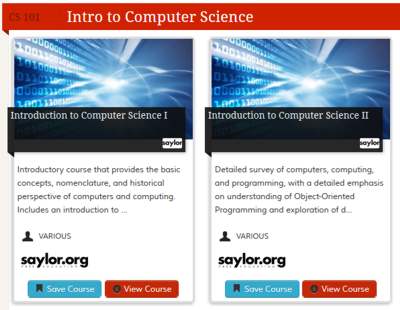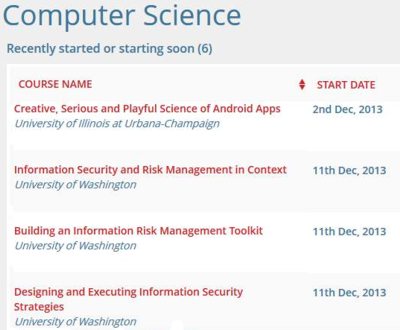| December Computer Science MOOCs and Online Courses |
| Written by Sue Gee | |||
| Monday, 02 December 2013 | |||
|
December is a quiet month for new classes, but there is one introducing Android programming to complete beginners that you might like to recommend to your not-yet programming friends. If next week's Hour Of Code is successful in getting school students interested in programming you may find yourself fielding questions, from parents and teachers as well as the kids themselves, about where to find more beginner-level material. For those prepared to make a commitment of 5-10 hours per week a new Coursera offering that starts today might fit the bill.
Creative, Serious and Playful Science of Android Apps is being taught by Lawrence Angrave of the University of Illinois at Urbana-Champaign. It is an 8-week course which is spread over 11 weeks as it takes a 3 week break over Christmas. This means you can start late and still hope to catch up. The rubric states: This course is a novice-friendly and delightful introduction to computer science and programming Android-apps for smart-phones and tablets. No prior programming knowledge is necessary. In this course you'll have fun learning to create an app for modern Android devices such as the Nexus tablet. You don't have to possess an Android device as you can use an emulator but you will need to download the Android SDK - which you are guided through in one of the first video lectures. The course has two tracks. The main part with 5 weeks of content between now and the end of January comprises an introduction to the basics of Android application development and creating your first Android app. For students who want to go further the optional Computer Science and Programming Track in the final three weeks has a third programming project and delves deeper into computer science fundamentals and beginner programming techniques. If this isn't the right course for you there's a new resource that might help you find the one you are looking for. CourseBuffet has over 500 free courses listed from MOOC providers Coursera, Udacity, edX, etc, and also from other providers such as the OpenCourseWare consortium and Saylor, and others. It uses a classification system that assigns a subject and level to every course and also asks its users to rate courses and provide reviews.
CourseBuffet currently lists over 100 Computer Science courses, the majority of them at intermediate level. The first two courses that come up is you look for introductory level courses in Computer Science are a linked pair from Saylor and are self-paced so you can start at any time. There's more reading than in a typical MOOC but all the materials are available as PDFs. Videos from Khan Academy and YouTube are also included and there are quizzes, exercises and programming activities. The total time commitment for CS 101: Introduction to Computer Science I is 94.5 hours and that for the follow on, CS 102, is 110.2 hours.
Saylor courses are academic in structure and its CS101 counts for college credit for some US schools. If you want a different approach Udacity's courses are more industry-oriented and take a more hands-on approach. In CS 101: Building a Search Engine you work on successively more difficult programming assignments while learning key concepts in computer science.
All the above classes for December are on the Coursera platform. Class Central also invites you to sign up for a MOOC tracker that sends you email notifications based on your interests - and so reminded me that the Android class was starting today.
More InformationRelated ArticlesBack To MOOC - September's Computer Science Courses Computer Science MOOC Round Up August Online Computer Science and July MOOCs June Computing MOOCs and Open Courses May Computing MOOCs and Open Courses April's Crop of Computer MOOCs A Dozen Free Online Computer Science Courses To be informed about new articles on I Programmer, install the I Programmer Toolbar, subscribe to the RSS feed, follow us on, Twitter, Facebook, Google+ or Linkedin, or sign up for our weekly newsletter.
Comments
or email your comment to: comments@i-programmer.info
|
|||
| Last Updated ( Tuesday, 03 December 2013 ) |







